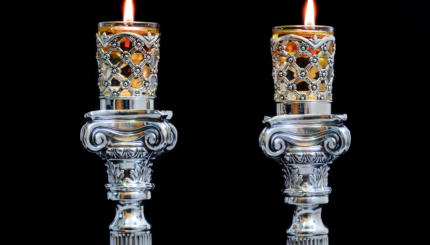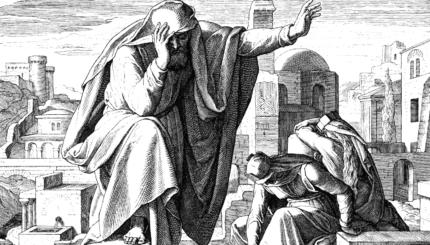Today’s post is from guest writer Joanna Brichetto, Experiential Educator at Nashville’s West End Synagogue, who also runs the website Bible Belt Balabusta. Her Hanukkah program was so cool, so we were THRILLED she wanted to share this post and her amazing pictures here on our blog!
When I teach Nashville kids about Hanukkah, I bring olives, olive oil and an oil
chanukiah
, but the connection of Hanukkah to oil always comes across as a little . . . underwhelming.
For too many years, miles and multicolored wax candles separate kids from the “miracle of the oil.” Until now.
This year, students at West End Synagogue Religious School in Nashville, got to make olive oil—
shemen zayit
—like Maccabees: with a life-size, working replica of a Hellenistic-era olive crushing installation, featuring a crushing wheel, pivot pole, and basin. Kids pushed the pole to rotate the “limestone” wheel over fresh olives, and scooped the mash into sacks for pressing. Meanwhile, costumed interpreters showed posters of the five-step oil production process from tree to Temple Menorah.
Underwhelming it was not!
I dreamed of bringing an olive crusher to our school for years, and looked for synagogues doing something similar, but aside from a handful of churches that host all-out Walk Through Bethlehem events, I found nothing. Chabad has an excellent franchised oil workshop, but it uses modern tools like an electric centrifuge, and I was after an experience as historically authentic as possible. I had to have a big wheel. A friend helped me track down plans for a crusher, and once I showed them to Sharon Paz, our Director of Lifelong Learning, she commissioned a congregant to build it for the school. Our 2nd century BCE replica looks remarkably like stone, and to see it is to want to work it. It is simply irresistible, which is an ideal descriptor for any lesson plan.
The crushing installation was the centerpiece of our Hanukkah “Oil Crush” program, around which rotated complementary oil-themed activities created by Sharon and myself. Students and families practiced brachot and how to light a chanukiyah; made oil-based treats for our homeless program; judged a kosher chanukiyah contest; made and ate latkes; decorated chanukiyot to take home; bobbed for sufganiyot; and nibbled at an olive oil-tasting bar. Even our tzedakah project was oil-based: we collected funds to help local seniors with heating bills.
Honestly, we didn’t end up with enough oil for a single “cruse,” much less enough to fill the Temple Menorah, but this very fact gave students a sense that it was no easy feat for Maccabees to make the massive amount of oil—of any quality—needed in a short time. Our program was more “exploration” than”“demonstration,” and we’ll certainly expand it next time. Meanwhile, a room full of families, volunteers, staff and teachers got a greasy, hands-on reference point to Hanukkah oil that no one is likely to forget.
P.S. Our Oil Crush program was funded by the West End Synagogue Religious School Enrichment Fund and the Jewish Federation of Nashville and Middle Tennessee.
Hanukkah
Pronounced: KHAH-nuh-kah, also ha-new-KAH, an eight-day festival commemorating the Maccabees’ victory over the Greeks and subsequent rededication of the temple. Falls in the Hebrew month of Kislev, which usually corresponds with December.
kosher
Pronounced: KOH-sher, Origin: Hebrew, adhering to kashrut, the traditional Jewish dietary laws.



